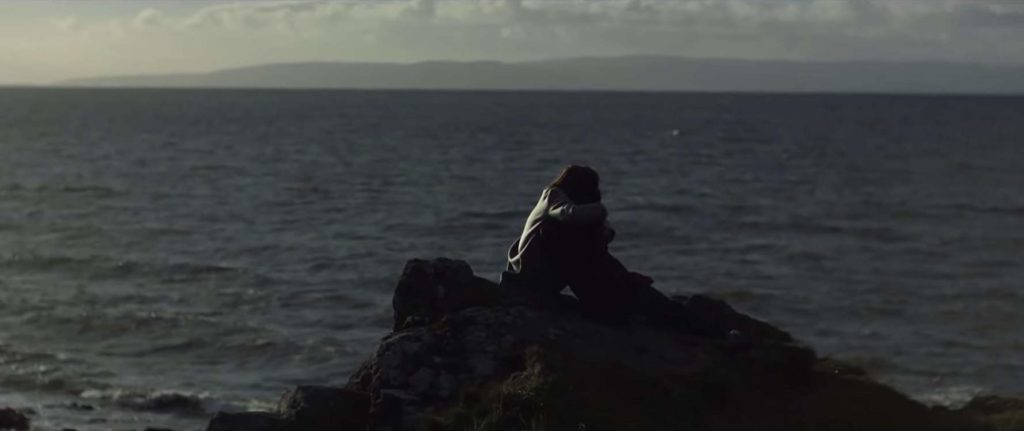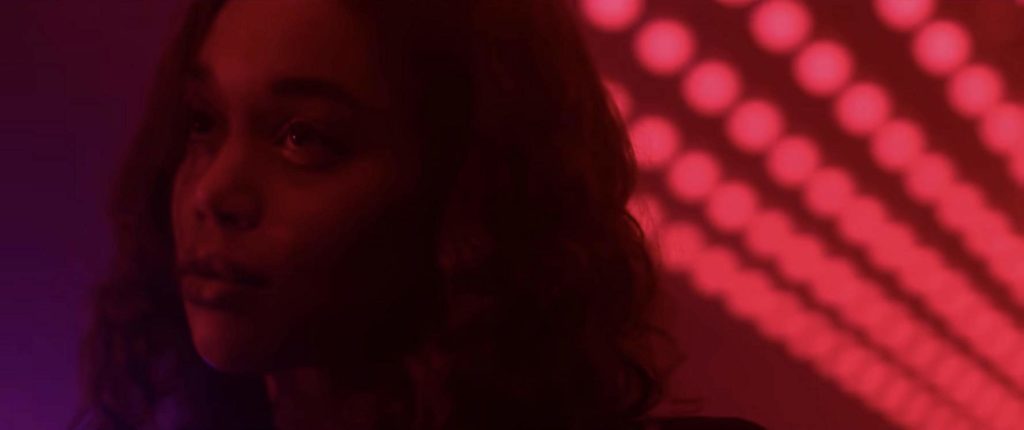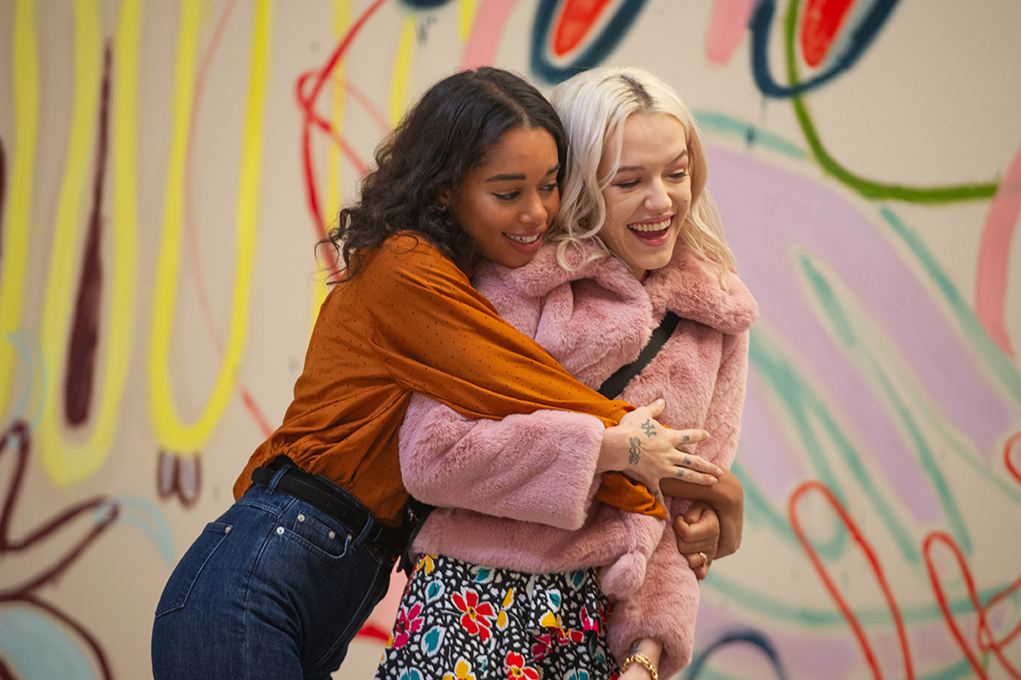Balance, Not Symmetry stars Laura Harrier (Spider-Man: Homecoming, Blackkklansman) as a Glasgow School of Art student whose life is thrown into a tailspin by the death of her father. Soon after and with the support of her best friend Hannah (Bria Vinaite, The Florida Project), she returns to school to finish her studies, leaving her mother (Kate Dickie) behind.
The film is directed by Jamie Adams, who wrote the story in conjunction with renowned Scottish band Biffy Clyro’s frontman, Simon Neil. The band also wrote the soundtrack album, comprising of seventeen original songs created specifically for the film. We sat down with the Welsh director to talk about the inspiration behind the film, the unusual creative process and the appeal of improvisation for this project. You can also read our interview with Harrier and Vinaite here.

What inspired the story for this film?
JA: It’s a film I’ve wanted to make for twenty years now, since I was 19. Essentially, my mum passed away while I was at university, and I knew that I was going to have to explore what I was feeling in a film, but at that age I wasn’t really mature enough to appreciate how to do that. So I put it to one side – I always thought it’d be music-led, but I didn’t know much else about it.
… I had such a great network of people at university that I didn’t want to stay home after the funeral. Being at home was difficult because dad became a different person, the way we all do when someone close to you passes. I wanted to explore that, and every four or five years I’d revisit it and think – who’s the band, who’s the artist?
Part of my life has been within music, in bands with my brother or as a promoter. I wanted it to be possible to explore the music as an album, and in the film it’s the music that transports you. I was very inspired by Quadrophenia (1979), because the film itself doesn’t have a lot going on; it’s about a lad who’s lost and trying to find his way. And that’s very much how I felt at the time. Then many years later production came around, and once I’d spoken to Simon, I discovered that he’d lost his mother in his mid-20s. That for him had created a real change in his song-writing.
How did you come to Biffy Clyro as the right sound for your story?
JA: I’ve been a massive Oasis fan since I was 13. My ideal band was one that was going to connect with me as much as they did. The first time I saw Biffy Clyro, I didn’t get them. They were in their formative years and I found them too heavy, but my friends were in a band called People in Planes, and they toured with Biffy Clyro. One of those friends told me that it was the lyrics, more than the music, that I needed to listen to. And after they wrote Puzzle, that’s when I really connected.

Why was now the right time for Balance, Not Symmetry?
JA: I think it was while I was filming Bittersweet Symphony that my dad fell ill, and that triggered memories of grief and losing my mum, and how I needed to explore that without the comedy veil.
What came first, the screenplay or the album?
JA: It was a two-way thing. We’d discussed general themes and characters, and Simon would go away and write some songs. And then that would inspire me to write some scenes, and he’d write songs based on those scenes. So sometimes scenes are influenced by songs and sometimes songs are influenced by scenes.
Why did you decide to have the lead be a woman, when it was based on your own biography?
JA: It wasn’t overthought. I think where it comes from is that generally, I work a lot with women. I’ve got a way of communicating, since my mum died, that’s more sensitive and – I’m quite a feminine man. I’m just able to communicate better with women, generally, and there’s more young women that I’m excited to work with than there are young lads. And I don’t know if that’s because so much has already been said about young men, but that’s the case for me.
On top of that, with my dad falling ill – my sister was looking after him, and it was the first time I saw what she was going through. And I realised I hadn’t thought twice about what she’d gone through with mum, because she was my older sister. So I was thinking about what it was like for a young woman to go through that. And watching my daughters with my wife Zoe, hearing how they talk to each other, it’s a completely different relationship daughter to mother than it is with a father, so I wanted to explore that.
What inspired your casting choices?
JA: Bria came on first; I’d approached her because I loved The Florida Project, because she’s so natural. There were a couple of scenes in that where she was left to her own devices, so I knew she could be present and in the moment. I don’t think Bria knows how to be anyone but herself. And the last thing you want with improv is someone who’s aware of the camera and aware they’re acting. You want them to be completely present. That was something I could see in Bria from her interviews. In interview situations, you see actors projecting a version of themselves, but if they feel real despite that, you know that they’re going to be able to improvise.
Originally we considered Sasha Lane in what is now Laura’s role, because her and Bria were already friends, and that makes the improv easier. But then I saw Blackkklansman, and I knew Laura had so much to offer. As soon as I spoke to her, it just made sense. I could tell that her and Bria would have a level of communication that no-one would know how to penetrate.

Will you be making another improv-based film in the near future?
JA: As the world becomes a more difficult place for artists to work in, especially with European money not being involved and America getting much more franchise-based. So I know from experience that I’ve probably got as far as I can in Britain, the way that I work right now. There’s not going to be anyone else who wants to make an improv film, because it’s too uncertain.
In that case, what’s next for you?
JA: I discovered this great story about a guy called Carwyn James, who was this Welsh rugby player, and my dad – I lost my dad two weeks before we started shooting this film – he was a big rugby fan. When you’re a kid in Wales, it’s like ‘here’s your milk, here’s your bread, and here’s rugby’. It’s such a staple part of Welsh identity. Anyway, I didn’t know about Carwyn James, but he was the coach who beat the All Blacks three times in three years, with three different teams.
I can’t believe that his story hasn’t been told – he’s one of the best coaches rugby has ever had, ask anyone. But it transpired as he was into his 40s that he was gay. So all of a sudden, the rugby world begins to push him out. I want to make a celebration documentary of what an incredible man he was.
Information on where to watch Balance, Not Symmetry can be found here.
